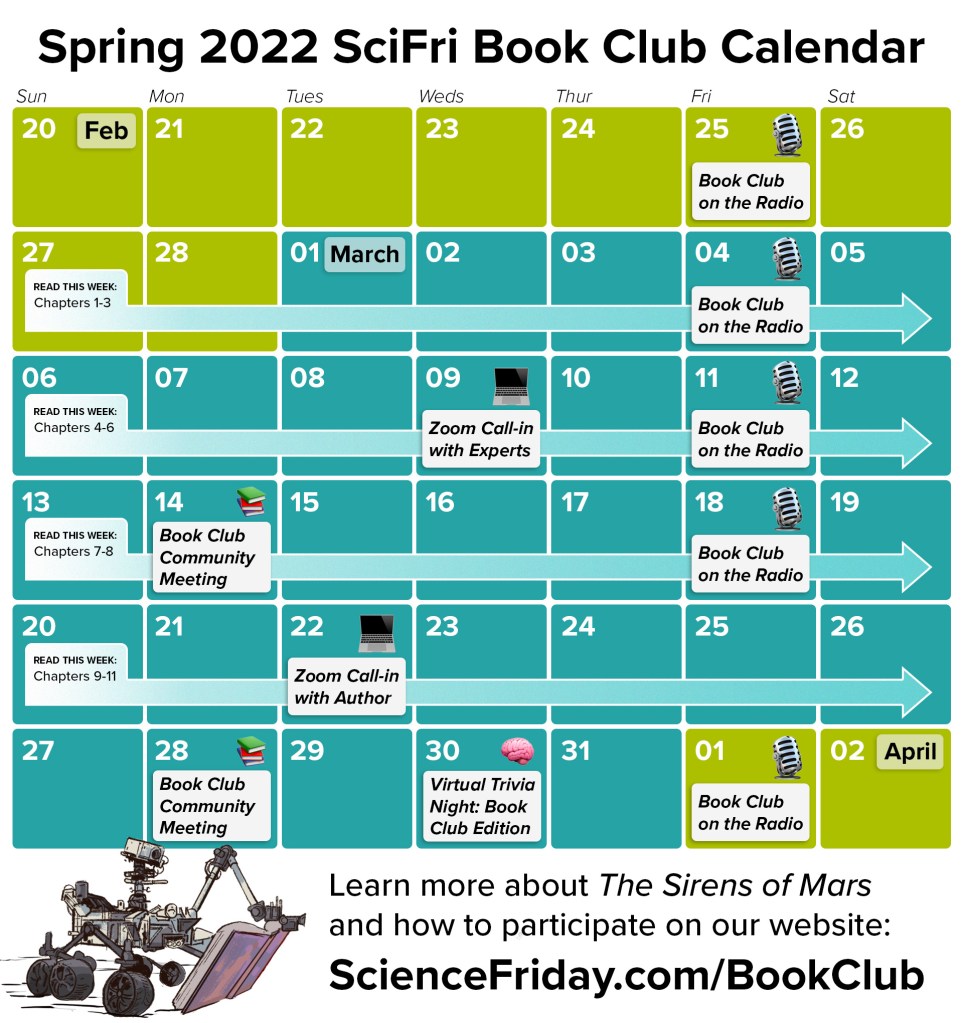Read ‘The Sirens Of Mars’ With The SciFri Book Club
Sarah Stewart Johnson explores humanity’s fascination with the Red Planet in ‘The Sirens of Mars.’ We’ll read it together this spring.
Welcome to our Spring Book Club about The Sirens of Mars. There’s lots of ways to participate: Read the book, listen to Science Friday throughout March, join our online community space, or send a voice message at (646) 767-6532 or on the SciFri VoxPop app.

Throughout the month of March, the SciFri Book Club will be exploring the past, present and future of the search for life on Mars with Sarah Stewart Johnson’s The Sirens of Mars: Searching for Life on Another World. Published in 2020, the book follows the history of humanity’s fascination with Mars, and what we discovered about its history—and ourselves—when we finally got the chance to see its surface clearly. Part personal memoir and part scientific historical journey, Johnson gives us a glimpse into years of passionate research about the red planet and our history of looking up at it. Get your copy from Powell’s or Bookshop.org.
Our Spring Book Club season officially kicks off on February 25, 2022, and you can read along with us! We’ll be following this schedule:
There are so many ways to dive in and participate. You can grab a copy of the book for 20% off from our friends at Powell’s or our local library partners, read an excerpt from The Sirens of Mars, join the discussion in our online Book Club community, sign up for a weekly email newsletter version of our community posts, or come to one of our upcoming events.
All good things must come to an end—and what a beautiful ending for this Book Club pick! Sarah closes out the book with a beautiful description of images from Mars, taken by Opportunity: “The terrain is bare, and the sky is still in the half-light of dusk. And on the horizon, with the dust having scattered all the red light away, the sunset glows an eerier, baffling, incandescent blue.” Plus, the extensive Notes section!
The Sirens of Mars is described as “deeply personal” and “a vivid history of the exploration of Mars.” The life experiences of the author, and her connection to other researchers along the way, are woven throughout the text.
Did you enjoy learning about the people who made the science in this book happen? Whose story were you most interested in or fascinated by, and why?
Discuss On Our Community Space
You can share your thoughts on our community space, reply to others’ responses, add relevant links or documents—whenever the time is right. And you don’t need to have read these chapters to join the discussion. We can’t wait to chat with you!
Looking for more science books about life, Mars, space, and the future of space travel and searching for life elsewhere—plus, some science fiction picks? Here are our picks for you:
We’ve made it to our last few chapters! We move into a more modern perspective of Mars: new missions, new satellites orbiting the planet, new people and perspectives studying our faraway neighbor—including exciting life milestones from the author.
We spend these chapters and many chapters before them with several different missions to Mars—Mars Observer, Mars Global Surveyor, Phoenix, and the Spirit, Opportunity and Curiosity rovers, all looking at, probing, or driving over the planet separately, and with different goals.
How do you think this diversity in approaches and objectives might serve as a benefit (or a disservice) to our understanding?
Discuss On Our Community Space
You can share your thoughts on our community space, reply to others’ responses, add relevant links or documents—whenever the time is right. And you don’t need to have read these chapters to join the discussion. We can’t wait to chat with you!
Want to dive deeper? Here are some articles, podcasts, videos, and more for you to explore!
We close out the second part of this book with Chapters 7-8. Sarah zooms in on our search for life on Mars, now that we’ve sent a few missions and even a rover to the surface. We’re introduced to more enigmatic researchers studying Mars, and Spirit and Opportunity arrive to explore the planet more closely.
The title of this book, The Sirens of Mars, suggests the planet calls, like a mythological sea creature, to humans, and reminds us of what many scientists believe is the key to finding life on Mars: water.
Why do you think humans are constantly in search of other life in the universe, including but especially on Mars? What is at stake in this search?
Discuss On Our Community Space
You can share your thoughts on our community space, reply to others’ responses, add relevant links or documents—whenever the time is right. And you don’t need to have read these chapters to join the discussion. We can’t wait to chat with you!
Want to dive deeper? Here are some articles, podcasts, videos, and more for you to explore!
We dive deep into the search for life on the surface of Mars in Chapters 4-6—the biological experiments aboard the Viking missions, the ALH84001 Martian meteorite found in Antarctica, and how Sojourner, the first rover to explore the planet, would probe rocks to find out their chemical makeup.
Lots of our understanding about possible life on Mars comes from experiments happening here on Earth—in the last section, Sarah spoke about dust simulant JSC Mars-1A, and in this section, about her exploration in extreme environments like deserts and volcanoes.
Let’s say we could only laser focus on one “extreme” environment on our planet to learn more about life on Mars—what environment would you advocate for, as our best bet for better understanding life on the Red Planet? The deep sea, the coldest desert, the highest mountains, or maybe somewhere else?
Discuss On Our Community Space
You can share your thoughts on our community space, reply to others’ responses, add relevant links or documents—whenever the time is right. And you don’t need to have read these chapters to join the discussion. We can’t wait to chat with you!
Want to dive deeper? Here are some articles, podcasts, videos, and more for you to explore!
We’re beginning with Chapters 1-3. (Don’t skip the Prologue—it’s a great way to start any book!) In these chapters, we get to know the author’s direct connection to the exploration for life on Mars, as well as the journey from the first drawings of the planet to our first photographs of its surfaces.
The first section of this book addresses our ever changing understanding of Mars, especially as it comes into focus. Scientists once thought the “wave of darkening” might be expanding and contracting vegetation; President Lyndon Johnson then despaired at learning Mars’ surface was likely devoid of life after Mariner 4 sent back photos of the surface. Lowell was convinced canals on Mars were signs of water, with a network of pipes across the planet; but the canals (and the civilization with public works) disappeared with hi-res images. What do you think is gained—for both scientists and the public—in seeing Mars clearly?
Discuss On Our Community Space
You can share your thoughts on our community space, reply to others’ responses, add relevant links or documents—whenever the time is right. And you don’t need to have read these chapters to join the discussion. We can’t wait to chat with you!
Want to dive deeper? Here are some articles, podcasts, videos, and more for you to explore!
Want to know all the exciting things we have going on for this Book Club season? Check out all the details below.
As always, if you’d like to purchase a physical copy, we encourage you to start with Powell’s Books, our partner for the SciFri Book Club, when looking to get your copy of the book. They are offering 20% off purchases of The Sirens of Mars throughout our Book Club season!
Not sure this is the book for you? Want to read an excerpt before you commit? We’ve got you covered.
Penguin Random House, the publisher of The Sirens of Mars, has offered SciFri Book Clubbers not just a snippet, but a whole chapter to sample. Click the link below to read an excerpt on our website, or download Chapter 1 to take the book for a test flight.
You can support your local library by checking out the book from our partner libraries! Science Friday has teamed up with libraries across the country have added additional ebook and physical copies of The Sirens of Mars to their catalogue for the duration of the Spring Book Club.
And as you start reading, join us on our online community space: the Science Friday Book Club is now on Mighty Networks, a platform where we can gather and read together. We’ve built this community space because you told us you wanted a better way to be connected with other SciFri Book Clubbers, and we hope you’ll join us there. You can learn more about why (and how) we created this new space here.
Mark your calendars, because the Spring 2022 season of SciFri Book Club kicks off strong on February 25, 2022! Find a full list of gatherings on the Book Club events page, or scroll down to RSVP to each (or every!) upcoming event.

You can RSVP to all of our events!
Christie Taylor was a producer for Science Friday. Her days involved diligent research, too many phone calls for an introvert, and asking scientists if they have any audio of that narwhal heartbeat.
Diana Plasker was the Senior Manager of Experiences at Science Friday, where she created live events, programs and partnerships to delight and engage audiences in the world of science.